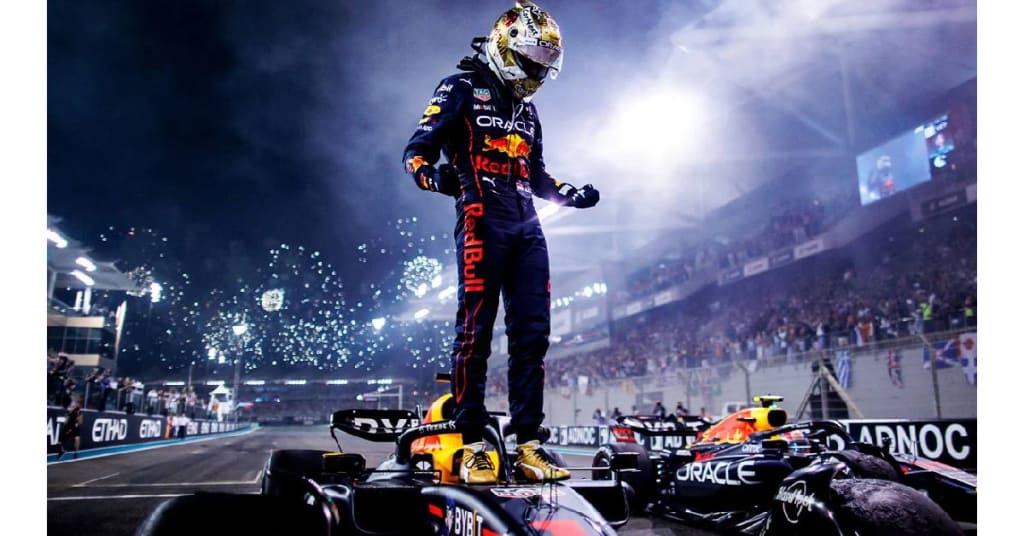Formula 1 - The Pinnacle of Motorsport
Speed, Technology, and Passion on the World's Most Prestigious Racetracks

Formula 1, also known as F1, is a premier international auto racing championship. It features some of the most talented and skilled drivers, competing for their respective teams. The sport's governing body is the Fédération Internationale de l'Automobile (FIA).
"I'm not saying Formula 1 is all about money, but you might as well replace the checkered flag with a dollar sign."
Formula 1 races are conducted on purpose-built circuits, known as Grand Prix tracks, and occasionally on closed city streets in certain urban locations. The championship typically consists of around 20 races held in different countries across the world, forming a calendar that spans several months.
The cars used in Formula 1 are sophisticated single-seaters, designed for high performance and cutting-edge technology. These vehicles are meticulously engineered to maximize speed and handling while adhering to strict safety regulations set by the FIA.
Teams in Formula 1 invest significant resources in research and development to gain a competitive edge. The sport's regulations are updated regularly to ensure fair competition and maintain safety standards. Teams compete not only for the Drivers' Championship but also for the Constructors' Championship, which is awarded to the team that accumulates the most points through its drivers' performances.
Formula 1 is known for its unpredictable and thrilling races, featuring strategic pit stops, intense on-track battles, and challenging weather conditions. The sport has a massive global fanbase and attracts millions of viewers worldwide.
Over the years, numerous iconic drivers have left their mark on Formula 1, such as Ayrton Senna, Michael Schumacher, and Lewis Hamilton, to name a few. These drivers have achieved legendary status and continue to inspire future generations of motorsport enthusiasts.
"Being an F1 fan is like being in a long-distance relationship - you wait for the weekend, and it's over before you know it!"
1. Racing Format:
Formula 1 races are conducted over a weekend, typically spanning from Friday to Sunday. On Friday, teams participate in two practice sessions to fine-tune their cars and familiarize drivers with the track. On Saturday, there is a final practice session followed by a qualifying session. The qualifying determines the starting grid for the race on Sunday. The fastest driver secures pole position and starts from the front of the grid.
2. Race Day:
The main race takes place on Sunday. It is a high-octane event, lasting approximately two hours. Drivers compete in a fixed number of laps around the circuit, and the first driver to cross the finish line is declared the winner. Points are awarded to the top 10 finishers, with the winner earning the most points (25 points as of my last update).
3. Pit Stops and Strategy:
During the race, drivers may make pit stops to change tires, refuel (if allowed), or repair any damage to the car. Pit stops are crucial as they can significantly influence the outcome of the race. Teams strategize to time their pit stops effectively, considering factors like tire degradation, weather conditions, and their competitors' actions.
4. Technical Regulations:
Formula 1 imposes strict technical regulations on the cars to ensure fair competition and safety. These regulations cover aspects such as engine specifications, aerodynamics, weight limits, and electronics. The FIA continually updates these rules to promote innovation while preventing excessive spending and maintaining parity among teams.
5. Safety:
Safety is of paramount importance in Formula 1. Cars are equipped with the latest safety features, including the Halo device, which protects the driver's head in the event of an accident. Additionally, circuit design, run-off areas, and safety barriers are carefully planned to minimize the risk of serious incidents.
6. Legendary Tracks:
Formula 1 visits iconic racetracks worldwide, each with its unique challenges and history. Some famous circuits include Monza in Italy, Silverstone in the UK, Spa-Francorchamps in Belgium, and the Circuit de Monaco in Monte Carlo.
7. Global Appeal:
Formula 1 has a massive global fanbase, with millions of viewers watching races from all corners of the world. The sport's popularity has also led to the emergence of various support races and feeder series that nurture young talent aspiring to reach the pinnacle of motorsport.
8. Sustainability Initiatives:
In recent years, Formula 1 has been actively pursuing sustainability measures to reduce its environmental impact. This includes promoting cleaner fuels, developing more efficient power units, and implementing eco-friendly practices at the circuits.
Formula 1 continues to evolve, adapting to the changing times while preserving its thrilling and competitive essence. As new technology emerges and fresh talents rise, the sport remains an exciting spectacle for motorsport enthusiasts worldwide.
9. Driver Contracts and Transfers:
Drivers in Formula 1 often sign multi-year contracts with teams. However, transfer moves between teams are not uncommon, especially when drivers' contracts expire or when they have the opportunity to join more competitive teams. Driver transfers can have a significant impact on the balance of power in the sport.
"Watching a Formula 1 race is like a roller coaster of emotions - you go from excitement to frustration in a matter of seconds!"
10. Team Dynamics:
Each Formula 1 team consists of two race drivers, as well as a reserve or test driver. The teams also employ a large group of engineers, mechanics, strategists, and support staff to manage various aspects of car development and race preparation. Team dynamics play a crucial role in achieving success, as effective teamwork and communication are vital for optimal performance.
11. Constructor's Championship:
Apart from individual drivers competing for the Drivers' Championship, teams also vie for the Constructors' Championship. This title is awarded to the team that amasses the most points based on their drivers' results. Winning the Constructors' Championship signifies the team's overall excellence in car design, development, and race strategy.
12. Pre-Season Testing:
Before the start of the Formula 1 season, teams participate in pre-season testing to evaluate their new cars' performance and reliability. These test sessions take place at various circuits, and teams use the data gathered to fine-tune their setups and make improvements before the season opener.
13. Technical Development:
Formula 1 teams invest heavily in research and development to gain a competitive edge. Car upgrades and new components are introduced throughout the season, reflecting the constant pursuit of innovation and improved performance.
14. Impact of Aerodynamics:
Aerodynamics is a critical aspect of Formula 1 car design. Cars are engineered to generate downforce, which increases grip and stability, allowing them to navigate corners at higher speeds. Finding the right balance between downforce and drag is a constant challenge for teams, as it affects straight-line speed and fuel efficiency.
15. Global Fan Engagement:
Formula 1 engages with fans through various means, including social media, official websites, and fan events. The sport embraces digital platforms to provide behind-the-scenes content, interviews, and live race updates, fostering a sense of community among fans worldwide.
16. Young Driver Development Programs:
Many Formula 1 teams have junior or development programs that nurture young racing talents. These programs help identify promising drivers and provide them with opportunities to progress through the motorsport ladder, eventually reaching Formula 1 if they prove to be successful.
17. Rule Changes and Adaptation:
Formula 1's rulebook is continuously evolving, aiming to improve competition, safety, and sustainability. Rule changes can influence car design, race strategies, and even the overall spectacle of the sport.
"Watching a Formula 1 race is like a roller coaster of emotions - you go from excitement to frustration in a matter of seconds!"
Formula 1 is a prestigious motorsport championship that captivates audiences with its high-speed action, technological innovations, and the remarkable skill of its drivers. It remains one of the most prominent and widely followed sporting events across the globe. Formula 1 remains a captivating and evolving sport, combining cutting-edge technology, human skill, and the thrill of high-speed racing. As it continues to push the boundaries of motorsport, Formula 1 remains a beloved and enduring spectacle for fans and enthusiasts alike.
About the Creator
Go With Trend
"Express, Connect, Impact - Welcome to "Go With Trend"!
Discover the magic of Letters on our vibrant platform. 🎙️ Share stories, sing your heart out, and connect with a global audience. 🌍 Unleash your creativity today! ✨ #"Go With Trend"






Comments
There are no comments for this story
Be the first to respond and start the conversation.